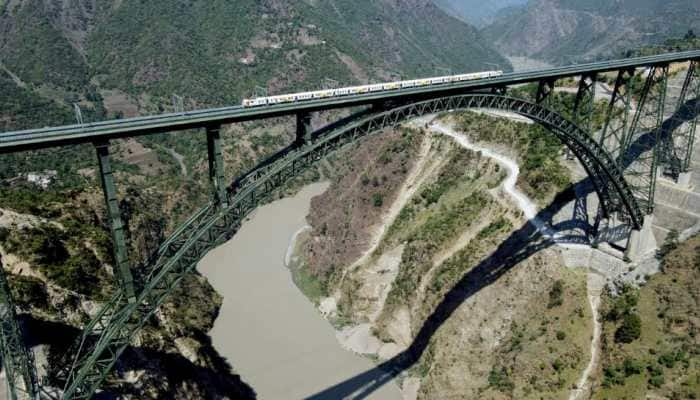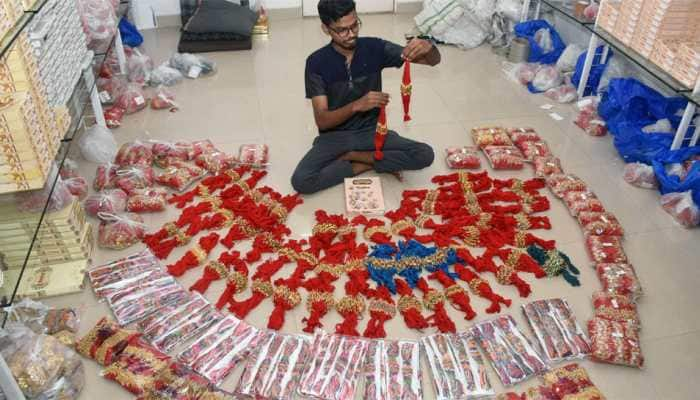Tata Steel puts UK biz on block; Govt, unions hunt for options
Tata Steel has put its entire UK business on the block, putting thousands of jobs at risk amid a deepening crisis in the country's once-storied sector that the Indian conglomerate had entered nearly a decade ago with a USD 14-billion takeover with much fanfare.
Trending Photos
) Pic for representational purpose only
Pic for representational purpose only London/Mumbai: Tata Steel has put its entire UK business on the block, putting thousands of jobs at risk amid a deepening crisis in the country's once-storied sector that the Indian conglomerate had entered nearly a decade ago with a USD 14-billion takeover with much fanfare.
Jolted by the decision, announced in the wee hours today by Tata Steel after a marathon board meeting at its Mumbai headquarters, the unions have given a call for nationalisation while the government authorities have assured nearly 17,000 workers at the company plants across the UK that all possible options would be explored to safeguard their interest.
Tata Steel, one of the flagships of the over USD 100-billion Indian conglomerate Tata Group, said it has decided to "explore all options for for portfolio restructuring including the potential divestment of Tata Steel UK, in whole or in parts" amid a "deteriorating financial performance of the UK subsidiary in the last 12 months".
Tatas had entered the British steel sector, which once dominated the British economy, in early 2007 with acquisition of Anglo-Dutch steelmaker Corus after a fiercely fought takeover battle -- which till date remains the biggest ever overseas acquisition by an Indian group.
Tata Steel had emerged the winner after a months-long takeover battle with Brazilian rival CSN that ended with a regulator-conducted auction running into nine rounds.
The decision was taken by Tata Steel, which employs nearly 17,000 people across UK, after intense deliberations till late night yesterday, including with the members of British trade unions.
Tatas have struggled hard to turn around Corus, which it renamed as Tata Steel Europe in 2010 and analysts feel it could be really difficult to find a buyer. They attributed the decision for sale of the business to the huge loans taken for Corus acquisition, as also to the tough environment being faced by steel firms in Europe, particularly in the UK.
In a joint statement, the UK and Welsh Governments said: "This is a difficult time for workers in Port Talbot and across the UK. During the review process, we remain committed to working with Tata and the unions on a long term sustainable future for British steel making.
"Both the Welsh and UK governments are working tirelessly to look at all viable options to keep a strong British steel industry at the heart of our manufacturing base."
Trade unions called on the government to take urgent action to save the crisis-ridden steel industry.
UK's largest trade union Unite said: "The growing chorus of calls for re-nationalisation cannot be ignored by the Conservative government."
Corus came into the being in 1999 after the merger with with Koninklijke Hoogovens of the erstwhile British Steel Plc, which was known as British Steel Corporation before being privatised in 1988.
Roy Rickhuss, the General Secretary of UK's largest trade union of steelworkers, Community, called for an urgent meeting with the Prime Minister saying:
"Today, I am calling on David Cameron to meet with me urgently to discuss how his government and my union can work together to safeguard the future of our steel industry."
In its statement, Tata Steel said, "Following the strategic view taken by Tata Steel Board regarding the UK business, it has advised the Board of its European holding company, Tata Steel Europe, to explore all options for portfolio restructuring including the potential divestment of Tata Steel UK, in whole or in parts."
In view of the severity of the funding requirement in the foreseeable future, Tata Steel Europe Board will be advised to evaluate and implement the most feasible option in a time bound manner, it added.
The board also reviewed the proposed restructuring and the transformation plan for Strip Products UK, prepared by the European subsidiary in consultation with an independent and internationally reputed consultancy firm.
It said: "Based on review conducted, the Board came to a unanimous conclusion that the plan is unaffordable, requires material funding support in the next two years in addition to significant capital commitments over the long term, the assumptions behind it are inherently very risky, and its likelihood of delivery is highly uncertain."
Following the announcement, Tata Steel shares today jumped by 6.75 percent to close at Rs 324.40 apiece on BSE, while the rating agencies including Standard and Poor's said the decision to sell the UK business could be credit positive.
In 2014-15 annual report, Tata Steel had said its indirect subsidiary Tata Steel UK Holdings executed agreements for refinancing of debt through term loans and revolving credit facilities of 3.05 billion euro. The debt was originally incurred in relation to acquisition of Corus.
Besides, another subsidiary Tata Steel Global Holdings Pte executed agreements for loan facilities of USD 1.5 billion that will be used to repay term debt, term out working capital and fund investment needs of Tata Steel Group outside India.
Of the total enterprise value of USD 14.2 billion, at the close of Corus acquisition process on April 2, 2007, financing included about USD 10.5 billion as bridge funding, the balance being applied out of Tata Steel's own cash and borrowings.
The company raised about USD 6.2 billion of term debt with an average life of around 5 years at competitive terms. This debt being non-recourse in nature was determined based on the cash flow servicing capability of its European operations and was to be serviced by Tata Steel UK (Corus) cash flows.
The syndication of the debt was completed during the year 2007-08 with over 25 banks and institutions.
However, shortly after the deal an economic slowdown and continued weakness in European markets hit the company's sales from which the steel maker is still trying to recover.
S&P Ratings Services said that Tata Steel's plan to restructure its UK operations, which could include potential divestment, will be positive for the credit profile of the company.
However, this may not be enough for a rating upgrade in the absence of a finalised restructuring plan, S&P's credit analyst Mehul Sukkawala said.
Regarding Strip Products UK, Tata Steel said its board concluded that it would "not be able to support" the investment necessary to proceed with the proposed transformation plan.
While the global steel demand, especially in developed markets like Europe, remained muted following the financial crisis of 2008, trading conditions in the UK and Europe have rapidly deteriorated more recently.
It is due to structural factors which includes global oversupply of steel, increase in third country exports into Europe, high manufacturing cost, continued weakness in domestic market steel demand and volatile currency, it said.
"These factors are likely to continue into the future and have significantly impacted the long term competitive position of UK operations in spite of several initiatives undertaken by the management and workers in recent years," Tata Steel said.
Even under such market conditions, the Group has extended substantial financial support to the UK business and suffered asset impairment of over 2 billion pound in last 5 years.
The firm has also been engaging with the UK government in recent months seeking its support to achieve the best possible outcome for the UK business, within the restrictions of State Aid Rules and other statutory limits, Tata Steel said.
These discussions are ongoing and will continue.
Discussions will also continue with Greybull in relation to a sale of the UK Long Products business. The UK government is also involved in the latter discussions, the company said.
Since last year, Tata Steel -- one of the top ten steel manufacturers globally -- has been battling one adverse situation after the other.
Last year in June, the company escaped by a whisker the ignominy of facing an industrial action by its employees and supported by the trade unions in the UK, which could have been the first such action in the country in over three decades.
Then in November 2015, Tata Steel said it is forced to go for more restructuring of its UK business due to a challenging marketplace and will sell Long Products Europe business by the end of the current financial year ending March 2016.
Also last month in an unexpected turn of events, it said Karl Koehler, the CEO of its embattled overseas arm Tata Steel Europe, resigned and the firm has appointed Chief Technical Officer Hans Fischer as its new chief.
Stay informed on all the latest news, real-time breaking news updates, and follow all the important headlines in india news and world News on Zee News.
Live Tv







)
)
)
)
)
)
)
)
)
)
